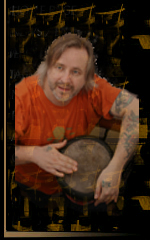Interview
with: RHYTHM (Summer 98)
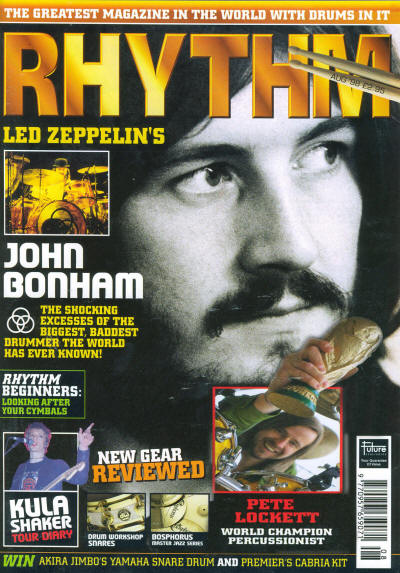
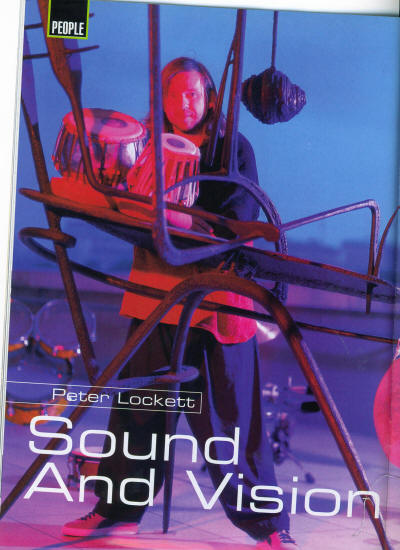
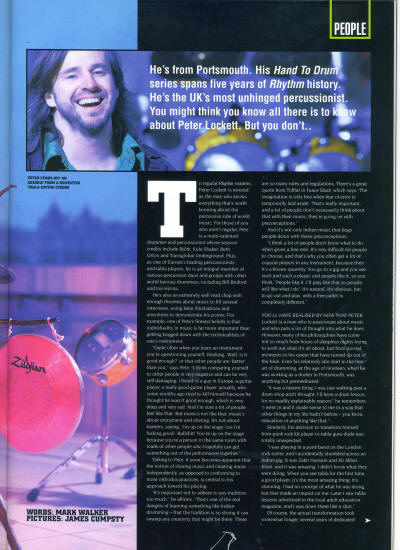
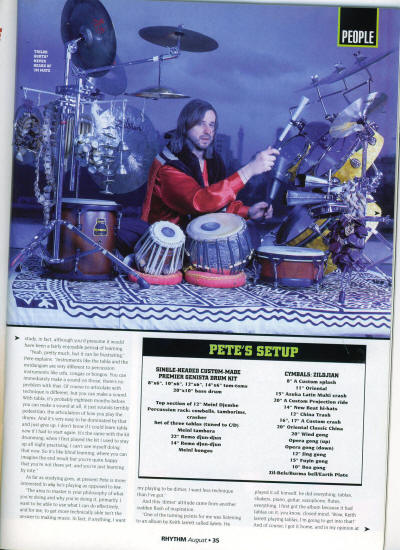
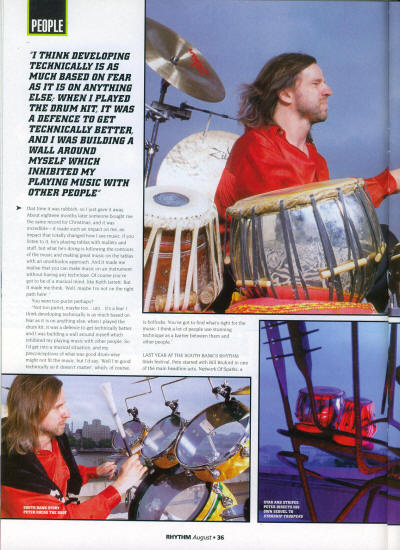
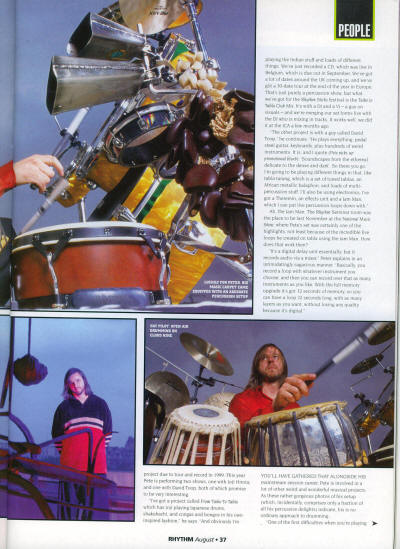
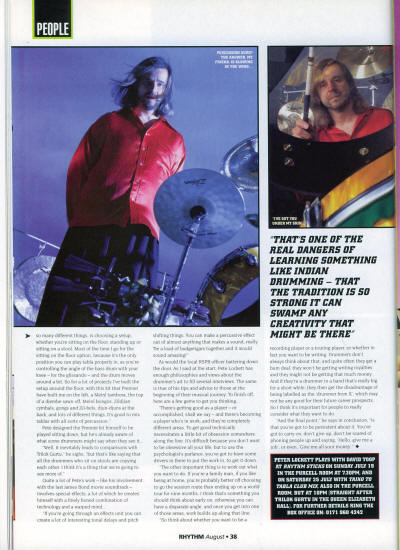
Sound and Vision
Interview:
Mark Walker
He's from Portsmouth. His Hand To Drum series spans five
years of Rhythm history. He's the UK's most unhinged percussionist. You might think you
know all there is to know about Peter Lockett. But you
don't..
To regular Rhythm readers, Peter Lockett is revered as the
man who knows everything that's worth knowing about the percussive side of world music.
For those of you who aren't regular, Pete is a multi-talented drummer and percussionist
whose session credits include Björk, Kula
Shaker, Beth Orton and Transglobal
Underground. Plus, as one of Europe's leading percussionists and tabla players, he
is an integral member of various percussion duos and groups with other world famous
drummers, including Bill Bruford and Joji
Hirota.
He's also an extremely well read chap with enough theories
about music to fill several interviews, using keen illustrations and anecdotes to
demonstrate his points. For example, one of Petes firmest beliefs is that individuality
in music is far more important than getting bogged down with the technicalities of ones
instrument.
Quite often when you learn an instrument you're questioning
yourself, thinking, Well, is it good enough? Or that other people are better than you,
says Pete. I think comparing yourself to other people is very negative and can be very
self damaging. I heard of a guy in Europe, a guitar player, a really good guitar player,
actually, who some months ago tried to kill himself because he thought he wasn't good
enough, which is very deep and very sad. And I'm sure a lot of people feel like that. But
music's not like that, music's about enjoyment and sharing. It's not about barriers,
saying, I'm up on the stage cos I'm fucking good. Bullshit! You're up on the
stage because you're a person in the same room with loads of other people who hopefully
can get something out of the performance together.
Talking to Pete, it soon becomes apparent that the notion of
sharing music and creating music independently, as opposed to conforming to more orthodox
practices, is central to his approach toward his playing. It's important not to adhere to
any tradition too much, he affirms. That's one of the real dangers of learning something
like Indian drumming; that the tradition is so strong it can swamp any creativity that
might be there. There are so many rules and regulations. There's a great quote from
Toffler in Future Shock, which says: The imagination is only free when fear of error
is temporarily laid aside. That's really important, and a lot of people don't
necessarily think about that with their music; they're going on with preconceptions. And
it's not only Indian music that bogs people down with these preconceptions. I think a lot
of people dont know what to do when given a free rein. It's very difficult for people to
choose, and that's why you often get a lot of copycat players in any instrument, because
then it's a known quantity. You go to a gig and you see such and such a player, and people
like it, so you think, People like it, I'll play like that so people will like what I do.
It's natural, it's obvious, but to go out and play with a free pallet is completely
different.
You'll have realised by now that Peter Lockett is a man who
is passionate about music and who puts a lot of thought into what he does. However, many
of his philosophies have come not so much from hours of sleepless nights trying to work
out what it's all about, but from pivotal moments in his career that have turned up out of
the blue. Even his relatively late start in the fine art of drumming, at the age of
nineteen, when he was working as a docker in Portsmouth, was anything but premeditated.
It was a bizarre thing; I was just walking past a drum shop
and I thought, I'll have a drum lesson, for no readily explainable reason, he remembers. I
went in and it made sense to me in a way that other things in my life hadnt before, you
know, education or anything like that. Similarly, his decision to transform himself from
punk rock kit player to tabla guru dude was totally unexpected.
I was playing in a punk band on the London rock scene, and I
accidentally stumbled across an Indian gig. It was Ustad Zakir Hussain
and Ali Akbar Khan, and it was amazing. I didnt know what
they were doing. When you see tabla for the first time, a good player, it's the most
amazing thing, it's stunning. I had no concept of what he was doing, but that made an
impact on me. Later I saw tabla lessons advertised in the local adult education magazine,
and I was down there like a shot. Of course, the actual transformation took somewhat
longer, several years of dedicated study, in fact, although you'd presume it would have
been a fairly enjoyable period of learning.
Yeah, pretty much, but it can be frustrating, Pete explains.
Instruments like the tabla and the mridangam are very different to percussion instruments
like udu, congas or bongos. You can immediately make a sound on those, there's no problem
with that. Of course to articulate with technique is different, but you can make a sound.
With tabla, it's probably eighteen months before you can make a sound at all, it
just sounds terribly pedestrian, the articulation of how you play the drums. And it's very
easy to be dominated by that and just give up. I dont know if I could learn tabla now if I
had to start again. It's the same with the kit drumming; when I first played the kit I
used to stay up all night practising. I can't see myself doing that now. So it's like
blind learning, where you can imagine the end result but you're quite happy that you're
not there yet, and you're just learning by rote. As far as studying goes, at present Pete
is more interested in why he's playing as opposed to how.
The area to master is your philosophy of what you're doing
and why you're doing it, primarily. I want to be able to use what I can do effectively,
and for me, to get more technically able isn't the answer to making music. In fact, if
anything, I want my playing to be dirtier, I want less technique than I've got. And this
dirtier attitude came from another sudden flash of inspiration. One of the turning points
for me was listening to an album by Keith Jarrett called Spirits. He played it all himself, he did everything: tablas,
shakers, piano, guitar, saxophone, flutes, everything. I first got the album because it
had tablas on it; you know, closed mind, Wow, Keith Jarrett playing tablas, I'm going to
get into that! And of course, I got it home, and in my opinion at that time it was rubbish,
so I just gave it away. About eighteen months later someone bought me the same record for
Christmas, and it was incredible - it made such an impact on me, an impact that totally
changed how I see music. If you listen to it, he's playing tablas with mallets and stuff,
but what he's doing is following the contours of the music and making great music on the
tablas with an unorthodox approach. And it made me realise that you can make music on an
instrument without having any technique. Of course you've got to be of a musical mind,
like Keith Jarrett. But it made me think, Well, maybe I'm not on the right path here.
You were too purist perhaps? Not too purist, maybe too...
um... it's a fear. I think developing technically is as much based on fear as it is on
anything else; when I played the drum kit, it was a defence to get technically better, and
I was building a wall around myself which inhibited my playing music with other people. So
I'd get into a musical situation, and my preconceptions of what was good drum-wise might
not fit the music, but I'd say, Well I'm good technically so it doesn't matter, which, of
course, is bollocks. You've got to find whats right for the music. I think a lot
of people use stunning technique as a barrier between them and other people.
Last year at the South Banks Rhythm
Sticks festival, Pete starred with Bill Bruford in one
of the main headline acts, Network Of Sparks, a project due
to tour and record in 1999. This year Pete is performing two shows, one with Joji Hirota, and one with David Toop,
both of which promise to be very interesting.
I've got a project called From Taiko To
Tabla which has Joji playing Japanese drums, shakuhachi, and congas and bongos in
his own inspired fashion, he says. And obviously I'm playing the Indian stuff and loads of
different things. We've just recorded a CD, which was live in Belgium, which is due out in
September. We've got a lot of dates around the UK coming up, and we've got a 30-date tour
at the end of the year in Europe. That's just purely a percussion show, but what we've got
for the Rhythm Sticks festival is the Taiko to Tabla Club Mix. It's with a DJ and a VJ (a
guy on visuals) and we're merging our set forms live with the DJ who is mixing in tracks.
It works well, we did it at the ICA a few months ago.
The other project is with a guy called David Toop, he
continues. He plays everything: pedal steel guitar, keyboards, plus hundreds of weird
instruments. It is, and I quote (Pete picks up promotional blurb): Soundscapes from the
ethereal delicate to the dense and dark. So there you go. I'm going to be playing
different things in that, like tabla tarang, which is a set of tuned tablas, an African
metallic balaphon, and loads of multi-percussion stuff. I'll also be using electronics;
I've got a Theremin, an effects unit and a Jam Man, which I can put live percussion loops
down with.
Ah, the Jam Man. The Rhythm Seminar room was the
place to be last November at the National Music Show, where
Pete's set was certainly one of the highlights, not least because of the incredible live
loops he created on tabla using the Jam Man. How does that work then? It's a digital delay
unit essentially, but it records audio via a mixer, Peter explains in an intimidatingly
sagacious manner. Basically, you record a loop with whatever instrument you choose, and
then you can record over that as many instruments as you like. With the full memory
upgrade it's got 32 seconds of memory, so you can have a loop 32 seconds long, with as
many layers as you want, without losing any quality because its digital.
You'll have gathered that alongside his mainstream session
career, Pete is involved in a lot of other weird and wonderful musical projects. As these
rather gorgeous photos of his setup (which, incidentally, comprises only a fraction of all
his percussive delights) indicate, his is no ordinary approach to drumming.
One of the first difficulties when you're playing so many
different things, is choosing a setup, whether you're sitting on the floor, standing up or
sitting on a stool. Most of the time I go for the sitting on the floor option, because
it's the only position you can play tabla properly in, as you're controlling the angle of
the bass drum with your knee for the glissando and the drum moves around a bit. So for a
lot of projects I've built the setup around the floor, with this kit that Premier have
built me on the left, a Meinl tambora, the top of a djembe sawn off, Meinl bongos,
Zildjian cymbals, gongs and Zil-bels, djun-djuns at the back, and lots of different
things. It's good to mix tablas with all sorts of percussion.
Pete designed the Premier kit himself to be played sitting
down, but he's already aware of what some drummers might say when they see it... Well, it
inevitably leads to comparisons with Trilok Gurtu, he sighs, but that's like saying that
all the drummers who sit on stools are copying each other. I think it's a thing that were
going to see more of.
Quite a lot of Pete's work, like his involvement with the
last James Bond movie soundtrack involves special effects, a lot of which he creates
himself with a finely honed combination of technology and a warped mind... If you're going
through an effects unit you can create a lot of interesting tonal delays and pitch
shifting things. You can make a percussive effect out of almost anything that makes a
sound, really. Tie a load of budgerigars together and it would sound amazing! As
would the local RSPB officer battering down the door. As I said at the start, Pete Lockett
has enough philosophies and views about the drummers art to fill several interviews. The
same is true of his tips and advice to those at the beginning of their musical journey. To
finish off, here are a few gems to get you thinking...
There's getting good as a player, or accomplished, shall we
say, and there's becoming a player who's in work; and they're completely different areas.
To get good technically necessitates a little bit of obsession somewhere along the line.
It's difficult because you dont want to be obsessive all your life, but to use the
psychologists parlance, you've got to have some drivers in there to put the work in, to
get it down.
The other important thing is to work out what you want to do.
If you're a family man, if you like being at home, you're probably better off choosing to
go the session route than ending up on a world tour for nine months. I think that's
something you should think about early on; otherwise you can have a disparate angle, and
once you get into one of those areas, work builds up along that line.
So think about whether you want to be a recording player or a
touring player, or whether in fact you want to be writing. Drummers don't always think
about that, and quite often they get a bum deal; they won't be getting writing royalties
and they might not be getting that much money. And if they're a drummer in a band that's
really big for a short while, they then get the disadvantage of being labelled as the drummer
from X, which may not be any good for their future career prospects. So I think it's
important for people to really consider what they want to do.
And the final point, he says in conclusion, is
that you've got to be persistent about it. You've got to carry on, don't give up, don't be
scared of phoning people up and saying, Hello, give me a job, or even, Give me all
your money.
Download PDF version of article
RETURN TO INTERVIEWS /
PRESS MAIN PAGE
 |

